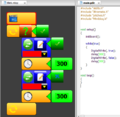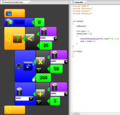| Minibloq | |
|---|---|
 Screenshot of Minibloq 0.8.Beta | |
| Developer(s) | Julián da Silva Gillig |
| Stable release | v0.83 / April 29, 2015 |
| Written in | C++ / wxWidgets |
| Operating system | Windows, Linux |
| Type | Visual programming language |
| Website | minibloq |
Minibloq is a graphical development environment for Arduino [1] and other platforms. Its main objective is to help in teaching programming. [2] It is specially used in robotics at elementary, middle and high schools. It's widely used in Argentina, where in the San Luis province alone, more than 60000 children have been trained with this software in public schools. [3]





